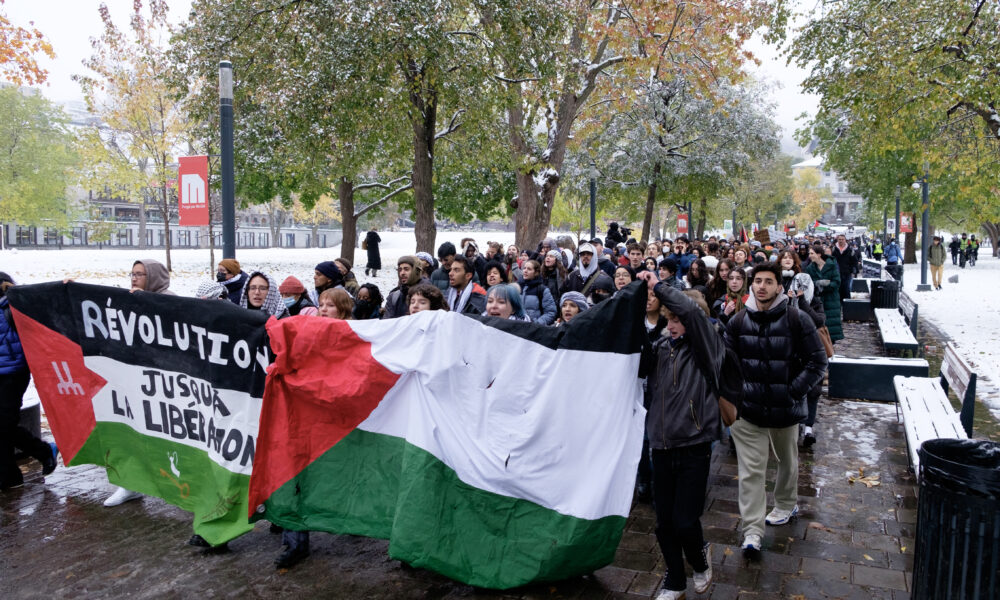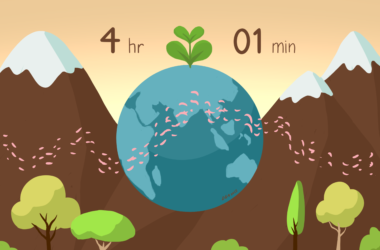Solidarity beyond interest-convergence
Fanta Ly, Features Editor
Solidarity is trending at McGill. The “historical anomaly” of the current mobilization lies in the diversity of positionalities standing against power. As a result, the face of those calling for solidarity is diversifying beyond specific student groups to encompass large portions of the student body as well as professors who are unionizing. Though the engagement of this ever-increasing coalition is commonly credited to rising solidarity, the more adequate term capturing this moment is interest convergence. This is not a pedantic distinction, but an essential one to understand. During times of interest aligning between different groups across campus, solidarity must be met with critical engagement on how interests and positionality shape this mobilization.
In his theory of the interest-convergence dilemma, Derrick Bell, an American lawyer, legal scholar, and civil rights activist, argues that the interests of Black people, the minority group, only advance when they converge with those of white people, the dominant group. This theory is an interesting framework for understanding the current moment, highlighting the nascent alignment of interests between professors and other groups on campus. However, it is also essential to reflect on past periods when this level of convergence and solidarity was not as widespread to engage authentically with the dynamics of change on campus.
This wave of mobilization and calls for solidarity unexpectedly includes white McGill professors, many of whom are getting their first taste of administrative violence, a novel and certainly unpleasant experience for many of them. Given this context, it is crucial for these professors to reflect on their involvement, whether it manifests as apathy, excitement, complacency, or continuous support. They should consider both their historical and current acts of solidarity, along with their reactions or lack thereof to the institutional violence they have undoubtedly observed before. This reflection can be bolstered through coalescence with organizations like the Black Students’ Network (BSN), Solidarity for Palestinian Human Rights (SPHR) at McGill, and Queer McGill among others. These groups have a long history of advocating for solidarity and improving campus life for marginalized students and others who have experienced the same violence. Despite facing continuous harm, they remain committed to fostering unity and support. For many, solidarity is both a means and an end. Recognizing the different stakes, both material and psychological, faced by those well-acquainted with solidarity is the starting point.
The current wave of unionization underscores how the privileged position of white professors has rarely led them to challenge the administrative violence that historically protected their interests. However, recent actions by McGill administrators seem to have disrupted the previously aligned interests between these professors and the administration. This shift places professors in a position all too familiar to those who have been marginalized by the same administration: an ongoing struggle to demand better and equal treatment. To be clear, demanding better working conditions differs fundamentally from defending one’s humanity against administrative violence. But the focus here is not comparing the scope of administrative violence, but emphasizing that it stems from the same source. Ending up side by side due to shared adversity is not the same as making a conscious decision to stand in solidarity.
Nevertheless, even this small commonality serves as a foundation for mutual support. Sustaining solidarity requires extending the love we show to ourselves when we demand to be treated better to others pursuing the same, regardless of our ability to relate to their experiences. This extension must be free from tone and policing, or any sense of entitlement to dictate how individuals articulate their demands.
In this period of interest convergence, we will witness both the convergence and divergence of ideas on what solidarity is and ought to look like. The real challenge lies not just in generating these ideas, but in taking intentional actions to ensure that the diversity of those embracing solidarity is maintained well beyond the present moment.
Solidarity and selflessness
Isaiah Albert-Stein, Opinion Editor
Working to serve others can never be truly selfless. No matter how difficult the work is, when you find yourself helping someone else, the sense of accomplishment and goodwill benefits you in return. The same is true for solidarity—it feels good to stand up for what’s just, especially when you are standing with others. A close friend explained this to me when I was 18. Or at least they told me something along those lines. But as an idealistic teenager trying to figure out my place in the world, I internalized a flawed message: Solidarity and selflessness are incongruent, and we have to make every effort to avoid being self-serving as we engage in activism.
In the years that followed, I fixated on instances of what I considered “selfish” solidarity. I grimaced as friends discussed the need to snap Instagram stories at a protest or the importance of adding experience with an advocacy group to their resume. On June 2, 2020, I encountered the most obvious example of self-serving solidarity: A feed full of people posting #BlackoutTuesday. For many, a black box with the hashtag as a caption served to solidify their status as a “good person” forever, as if a social media post would end racism immediately. Encountering activism that carried personal or professional benefits validated my naive, black-and-white view that selflessness in solidarity was ultimately unattainable. This doesn’t mean I stopped speaking out for causes I cared about or doing work to try to build a better world. If anything, I worked even harder for the things I believed in. I tried desperately to find out how anyone could be selfless, then beating myself up when I felt proud of successful organizing or when I felt fulfilled after supporting others.
Recently, I finally reached a realization that had spent years hiding behind these surface-level contradictions I kept telling myself: Selflessness should not prevent us from benefiting from solidarity. Solidarity is not transactional. It emerges from our connection with others, not from giving or receiving as if it were an object. Whether the cause is standing up for anti-racist movements, workers’ rights, or Palestinian liberation, solidarity does not exclusively benefit the people most affected. We should feel good about standing with others. When attending a protest or organizing within your community makes you feel more hopeful and less alone, it is not an intrusive feeling of selfishness; rather, that positive feeling is the whole point. To feel collective grief, mobilization, and optimism is the very core of solidarity—and selflessness means recognizing yourself as part of this collective community and working actively to make it better.
Nurturing Arab culture
Yusur Al-Sharqi, Staff Writer
Growing up in Canada as an Iraqi immigrant, my parents were determined to preserve our Arab and Muslim heritage. Admittedly, I often resented them for this; not a Sunday went by when I did not complain about the Arabic classes my mom forced me to attend. However, a frightening realization struck me when I came to McGill. I would no longer have someone to ensure that I immerse myself in my culture. I feared that the daunting task of preserving Arab culture in my own life would rest solely on my shoulders. However, recent events at McGill in support of Palestinian liberation have shown me that I am not alone in this preservation; solidarity flows all around me, in all directions.
For many Arabs, the Palestinian struggle feels inherently linked to our own countries’ struggles against colonialism and imperialism. I was reminded of this when I heard the Iraqi national anthem, Mawtini—meaning homeland—at a Palestinian rally on campus. It was at that moment that I discovered it was also an anthem of Palestine. I was awestruck that a song so pivotal to Arab pride would be played aloud and with such pride on McGill’s campus, heard by non-Arab students from across the world.
I am not usually one to lavish praise to allies—not because I do not appreciate their efforts, but because I feel they receive enough credit as is—but McGill students’ solidarity with the Palestinian cause demands acknowledgement. Taking a stand against the Israeli regime is fraught with risks such as doxxing and harassment. Yet, many McGill students and organizations bravely persist. And every time they do, they make it known that McGillians from diverse backgrounds, even with no personal ties to the cause, are rooting for peace and transformation in the Arab world.
My cultural preservation did not end with my parents sending me to school with kibbeh, a Levantine roll of ground beef and bulgur wheat, in my lunchbox while my white friends got PB&J sandwiches. It continues from the Arabs around me who make Moroccan tea every night and wear abayas at dinner parties; it flows from my non-Arab friends who say mashallah every time they pay me a compliment and the non-Muslims who host iftars despite not fasting themselves. Most of all, solidarity pours from the displays of Palestinian support by various organizations and individuals at McGill. As I reflect on this, any sense of anxiety around my cultural heritage dissipates; I feel more connected and proud of my Arab identity than ever.









